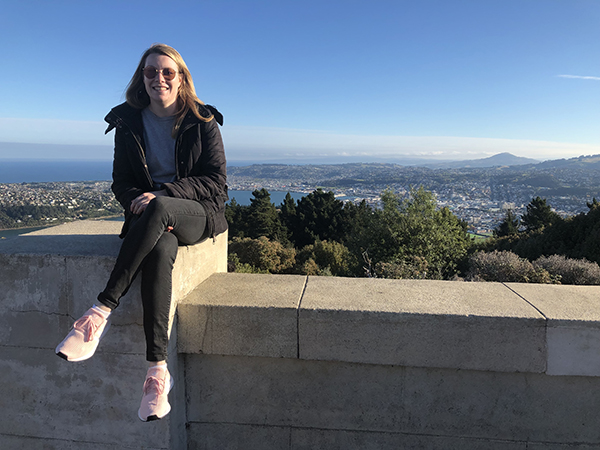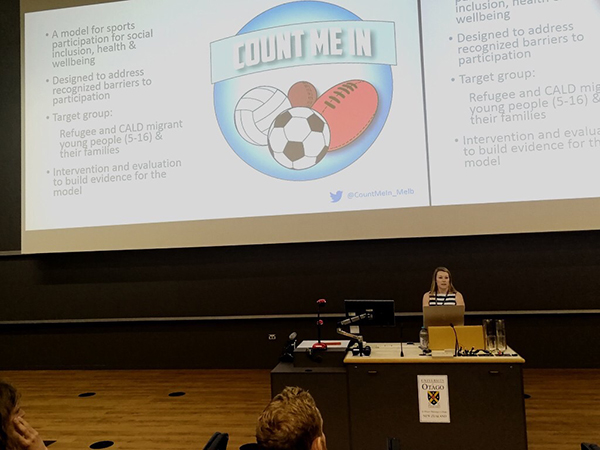Scholarship recipients
Elizabeth Waters Memorial Travel Scholarship Recipient Reports

Early in 2016, the Elizabeth Waters Memorial Travel Scholarship was established by Liz’s friends and family to honour two of Liz’s great passions in life: excellence in child public health and travel.
If you would like to donate, please click here.
-
2022 Katitza Marinkovic Chavez
Supporting Global Child Mental Health in the Climate Emergency
Kati is a Research Fellow at the Child & Community Wellbeing Unit. Her work focuses on promoting children and young people’s empowerment and wellbeing in contexts of climate change, disasters, and domestic violence. Kati applied to the scholarship to attend the XI International Collaboration for Participatory Health Research (ICPHR) Annual Working Meeting in 2019 to organize an international working group interested in applying a rights-based approach to doing research with children and young people in the field of climate change.
Due to the COVID-19 pandemic, the ICPHR Annual Working Meeting was carried out online during 2020 and 2022. During this time, Kati contributed to maintain and strengthen the ICPHR and the Kids in Action Network by joining the network’s Steering and Coordination Committees and facilitating workshops about doing online research with children and youth. This work allowed her to use her scholarship to attend the XII AWM in Huelva, Spain and achieve the following:
- Establishing multinational collaborations and networks with English, Spanish and Portuguese-speaking researchers by facilitating workshops during the Annual Working Meeting and acting as MC at the ICPHR Pre-Conference.
- Establishing international collaborations for shared learning on children and young people’s participation in climate change action and climate change adaptation, including the University of Birmingham.
- Disseminating Your Climate Superpowers, a resource co-designed with children and young people in Victoria.
- Joining the Ethics and Literature Review working groups to support an upcoming project on the experiences of young people who engage in climate litigation.
- Linking with international researchers to include the SEED resources for building community partnerships in the upcoming Child and Community Wellbeing Unit digital resource on child rights-based research (funded by Melbourne School of Population and Global Health Pitch Scheme).
-
2018 Dana Young
Reflections from the World Congress of Sociology of Sport, Dunedin NZ
It was such a privilege to receive a travel scholarship in Liz’s name, and now reflecting on what was shared and gained by this international scholar travel opportunity allows me to appreciate the opportunity further.
My aim for the scholarship was to firstly further my academic career by enabling the fostering of networks with academics aligned closely to the field in which I will conduct my PhD research. Secondly the congress was to be an opportunity to raise the profile of the current work undertaken by The Jack Brockhoff Child Health and Wellbeing Program, through the presentation of key findings from the Count Me In project, a research action project understanding the role of sports participation at local sports clubs for facilitating social cohesion and improving health, wellbeing and resilience in children and youth from refugee and migrant backgrounds.
I can happily say attending the World Congress of Sociology of Sport in April 2019, an annual conference organized by the International Sociology of Sport Association (ISSA), was extremely worthwhile. It was held in Dunedin, New Zealand, a quaint and beautiful city. Attendance at this conference was an unfamiliar crossover from my field of public health into sociology, and initially I did feel like a fish out of water. By the end of the conference I came away knowing that using sociological skills learnt at the congress to understand an issue and my public health skills to design interventions to trial solutions is where my academic passion lies.
For the first time a pre-congress PhD workshop was offered. I was fortunate enough to be able to attend this two-day workshop where general skills on how to thrive during a PhD were discussed. This opportunity was fantastic as I was able to network with like-minded PhD students, all interested in understanding how sport can play a role in our lives. This peer networking not only facilitated links with up and coming scholars who have a similar interest, but I formed rich friendships with people around the world. The organizers of this workshop from the University of Otago were extremely generous, arranging a bus tour of the city and arranged group dinners each night – which is always much appreciated!
My presentation on ‘Count Me In’ generated great interest and enabled me to connect with prominent Australian researchers who have a particular interest in understanding how sport can be a ‘hook’ for programs that aim to facilitate integration for refugee and newly arrived migrants.
Thank you to Paul, Charlie and Lara and the scholarship committee of Liz’s friends and colleagues for this wonderful opportunity to travel internationally, in which I was able to connect with other scholars that has positively influenced my PhD research and the Count Me In project. -
2018 Eva Alisic
The Elizabeth Waters scholarship has been such a wonderful opportunity! My aim for the scholarship was to build and strengthen connections with researchers and practitioners in the field of children’s (post-trauma) mental health, with a focus on Africa and South-East Asia through interactive conferences, and Australia through research meetings. Within the scholarship year, this has led to multiple opportunities. One highlight was the opportunity to participate in and present at the ASEAN Emerging Researchers Conference, held in Malaysia in December 2018 (see picture). I met several researchers there who do mental health and mental health systems research in South-East Asia and learned about local approaches to research collaboration.
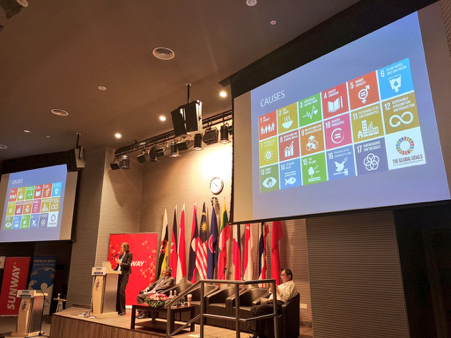
A second highlight was the 5th edition of the Africa Science Leadership Program, where I learned about large, community-oriented mental health projects in Uganda and Zimbabwe, among others. The multi-day program also coincided with several other workshops at the Future Africa campus, including on transdisciplinary research and the process of translating research findings into policy outcomes. The programs brought over 100 researchers from across the African continent as well as from other continents together, and it was very inspiring to see examples of collaborations across a diversity of ‘boundaries’.
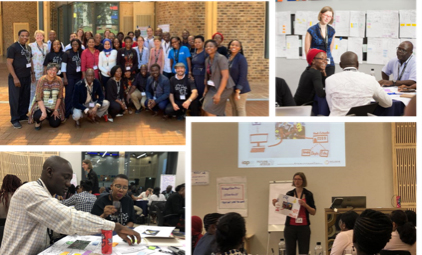
Third was the 10-year anniversary of the Global Young Academy (see picture), which brought global researchers together in Germany. In this context, the most impressive conversations I had related to initiatives to improve support for refugees and migrants. All these international visits, from the ASEAN Emerging Researchers Conference to the Global Young Academy meeting were incredibly rich in challenging assumptions and looking for creative ways to work together for a common good.
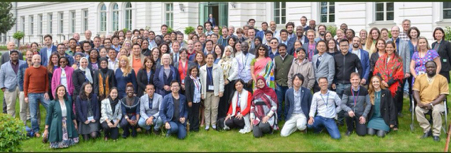
Finally, closer to home, a highlight of the Scholarship was a visit to Brisbane where I had the opportunity to talk about children’s mental health after fatal family violence for an audience of over 100 attendants including clinical and research staff from Queensland Health and Queensland Children’s Hospital.
The various elements of the Scholarship together have given me substantial food for thought. One of the ideas that I would like to progress to scale up our visiting scholarship opportunities and/or organise an international research workshop to continue the conversations that have started. A second, more concrete outcome, is that I’m working on a new paper regarding child traumatic stress interventions with colleagues involved in the Brisbane visit. And third, both the Global Young Academy and Queensland visits involved participation in (video) recordings; once available, these will help with communicating my work going forward.
A big thank you to the Scholarship committee for awarding me this wonderful opportunity, and to everyone involved in the organisation of the visits involved in the Scholarship, including (but not limited to!) the Global Young Academy team, the Future Africa team, the ASEAN Young Scientists Network, Dr Alex De Young, Dr Orakanoke Phanraksa, Prof Abhi Veerakumarasivam and Prof Bernard Slippers. -
2017 Jodie Doyle
Reflections from the Global Evidence Summit, Cape Town.
It feels both incongruent and highly appropriate to hold a global conference to discuss methods, quality and utility of evidence for decision making for health and social outcomes in Cape Town, South Africa. The taxi driver delivering us from the airport was very concerned about the dismal water situation at the end of a dry winter, with only 25% reservoir capacity reached. He saw the problem primarily made more dire by a government lacking good policy to address the situation as well as an underlying unease that there was 'something else going on here', suggesting industry influence which benefitted from this desperate situation. At the Global Evidence Summit, we were greeted by warnings of non-violent muggings around the conference venue and advised not to walk alone on the streets, and certainly not after 10pm (we brought this forward to 8pm thereafter). A speaker in the first plenary highlighted the context in which the available evidence is thwart when desperate people are forced to live in substandard 'housing' in over-crowded communities with no reticulated water, waste removal or access to health and duration services. One province mentioned has only two oncologists for six million residents.Trying to summarise the learnings from the Summit is a difficult task but I shall highlight a few. I enjoyed presentations and discussions around what to include in reviews of 'complex' interventions - not just whether something works, but how it influences and is influenced by factors within the social system it invariably operates within. It is this information that can be useful for decision makers working in very messy contexts, with a variety of population groups and with a variety of stakeholders and resources to be taken into consideration. This is something we have always endeavoured to cover in our Cochrane Public Health (CPH) reviews.
I participated in a meeting with a co-author on a published CPH review, who was now working for the Bill and Melinda Gates Foundation. She had sought CPH out to identify ways they could help to identify best evidence for immunisation uptake specific to populations and contexts of interest. Consistent with the themes of the conference were discussions around prioritisation of criteria to guide what evidence to collect and synthesise, taking into account time/urgency, resources, policy implications and political 'doability'.
With the CPH joint Coordinating Editors, we had an extremely useful and collegial meeting with our CPH Europe members, including one of the leads who has been nominated to the Cochrane Board - so a great contact for our group to have. We discussed how we might best utilise the people resources we have to improve editorial processes, quality of the reviews and expand dissemination of review findings (in several languages) across the globe. Let me mention here also, a most productive and congenial dinner meeting with six of our CPH editors, at a wonderful African restaurant, where bongo lessons were the entrée to our shared meal.The final plenary was particularly current and unfortunately poignant, as the panellists, led by Trisha Greenhalgh, discussed where evidence sits in a "post-truth" world. Recognition of a need to identify evidence that is credible, relevant and inferential, sits within a need to acknowledge that ‘evidence’ exists within a plethora of factors that need to influence decision making (including local data, resources, political context, acceptability etc.). There is an inevitable picking and choosing of evidence to persuade – which should always be tempered with an understanding of the audience's points of view. Invariably evidence is used by individuals to bolster their existing thoughts, not to question them. People have lost trust in 'experts' and in government institutions. One of the solutions offered up that resonated with me...we need to learn to listen just as much as we need to learn how to tell evidence stories in many different ways. And that evidence will not speak for itself - we need to speak for it. The importance of us all being ambassadors for evidence was emphasised -
talk about your work with your community and listen to what they believe are the barriers to action. Give them the knowledge to fight for science too. There is a need more voices for science, so engage them in the process at all stages. Ask people how your research findings might affect their lives. Ask them what research questions would be important to them.
I remembered the taxi driver and his concern for reduced water availability and his theories of causation. I was glad he told me. I wished I had more local knowledge of the situation that I could have shared with him. Perhaps my empathy was enough...in this context. Taxi drivers are a great potential source of advocacy...there are many, many others.I also thought about the previous time, in 2000, when the Cochrane Colloquium was held in Cape Town. A new face to Cochrane attended and was also inspired by the city and with Cochrane’s pursuit of best evidence and the need to ‘spread the word’. This was Liz Waters and she did a most brilliant job of inspiring others to travel and to share evidence and stories, from and to all corners of the globe. I thank her for this experience, and so many others she made possible for me.
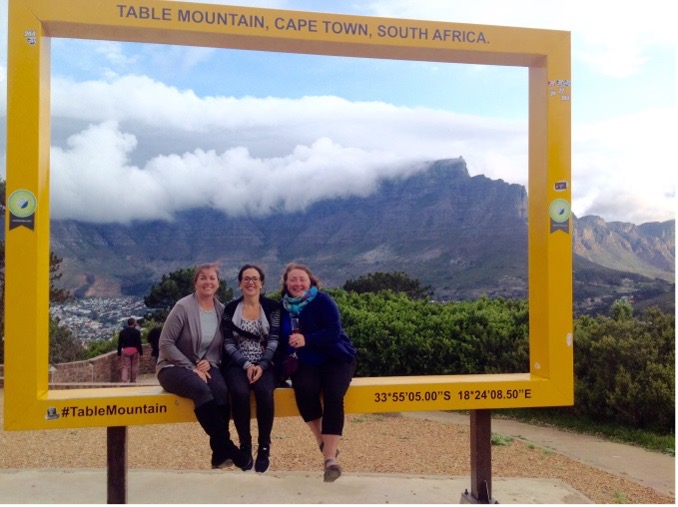
-
2016 Martin Hall
This scholarship was used to support Ms Ana Tilman a Dental Therapist working as the program officer of Kose Nehan, a school oral health program in Timor Leste, to travel to Melbourne for a 3 weeks study tour. The Jack Brockhoff Child Health and Wellbeing Program is concerned with the key drivers for child health and this scholarship has contributed to this via allowing an international child oral health worker the opportunity to learn and collaborate with the Jack Brockhoff Child Health and Wellbeing Program team and other health service providers.
The purpose of her visit was:
- Attending a training program in epidemiology at the Jack Brockhoff Child Health and Wellbeing Program, Melbourne School of Population and Global Health
- Exposure to Victorian public oral health including an Aboriginal community controlled health organisation
- Attending a conference “Putting the Mouth Back into the Body” held at North Richmond Community Health
- Promotion of the Kose Nehan Oral Health Program
Outcome of award:
Networking and increasing awareness of child oral health in Timor Leste
- Presentation at “Putting the Mouth back into the Body” conference
- Presentation at two Timor Leste friendship organisation functions – Friends of Baucau committee meeting and Friends of Aileu dinner function
- Primary school visit
Ana’s conference attendance, her visit to an Australian school and Timor friendship organisations to promote Kose Nehan enhanced her confidence and advocacy skills. She was successfully able to describe and educate the Australian audience in the poor oral health situation in her country and the challenges of developing an oral health program to meet those needs. Her engagement with the friendship groups encouraged them to support an expansion of the Kose Nehan to 12 more schools.
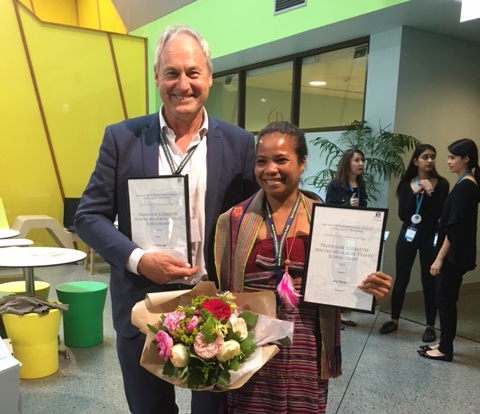
Image: Martin Hall and Ana Tilman
Observation of public oral health in Victoria- Clinical activities at North Richmond Community Health
- Pearly White aged care outreach program
- Chompers school oral health program
- Robinvale Aboriginal Oral health Program at Murray Valley Aboriginal Cooperative
Ana was exposed to many facets of the Victorian oral health service, this experience broadened her knowledge of the range of services and sites where outreach dental care can be successful. She had the opportunity to directly observe clinical treatments, Australian standards of care including infection control and modern materials used in a preventive based program. These are directly applicable to the further development of dental services in Timor Leste and contributed to her ability to influence decisions made in the Kose Nehan program.
Skills Development and Capacity Building in Health Promotion
- Attended training in health promotion and basic qualitative evaluation
- Delivered Health education classes in Australian schools
Anna‘s training in health promotion and evaluation while in Melbourne have supported the further implementation and evaluation of Kose Nehan oral health program. She is now collecting and collating monthly data and writing reports on those activities for evaluation purposes.
Extension of the Kose Nehan Program
- Two new districts are now included in the Kose Nehan program
Ana’s health promotion and evaluation skills now being used at two additional districts (Baucau and Maubisse) following the expansion of Kose Nehan. A total of 18 schools (~3,000 children) are now under her supervision for tooth brushing and preventive based care. The scholarship also developed her confidence and leadership capabilities. As a result local dental staff led by Ana are now taking ownership for Kose Nehan and supporting its expansion to those other districts
All activities Anna engaged in while in Victoria and the skills/experiences she developed and how it is being used to improve child oral health in Timor Leste.
-
2016 Ana Tilman
I would like to said thank you very much for Director of University Melbourne Dra. Lisa with her team that gave me true the scholarship and I would like to said thank you very much for Dr. Martin Hall with all the doctors, I have learn so many things from Director University Melbourne Dra. Lisa and all the Doctors from Clinical North Richmond Community Health (NRCH) and I would like to said thank you for Mana Marcella because she drop me visit school RMIT to observation check the students practise. Before the students go to practise Mana Marcella teach me with a students about how to do the treatment when the patient visit you in a clinic and how you are work as Doctor.
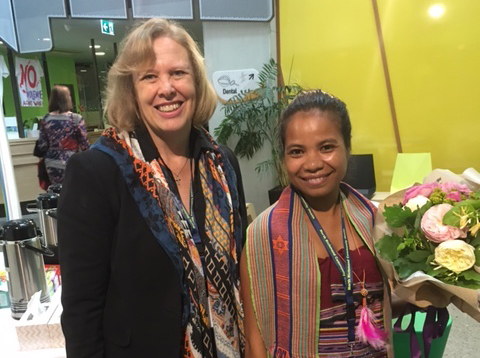
Image: Ana with Lenore Tuckerman (Colgate)
I am very appreciated to all the doctors, Dental Nurses from NRCH because they are very happy to see me when I visit the Clinical NRCH and they are very helpful when I observation with them when the patient come and do the treatment. They are teaching me about infection control ,how do we clean the Dental Chair when we finished do the treatment for the patient, when we are as assistant to help doctor if the doctors asked you to take some equipment you should took the gloves out, you can’t take with a gloves because it was dirty, they tell me you should changes the mask and gloves one patient one gloves and one mask do not used the mask permanent because it was dirty to other ways it will bring the dirty for your health when you bread. They are teach me the position if am work as operator to do the treatment for the patient and they are teach me how do we used the words to talk to the patient when the patient visit the clinic or Hospital. When I have learn all this experience that teach/share by all the Doctors and Dental Nurses in NRCH, I compared is very different when I have learn in east Timor because it’s look different more then my Country.
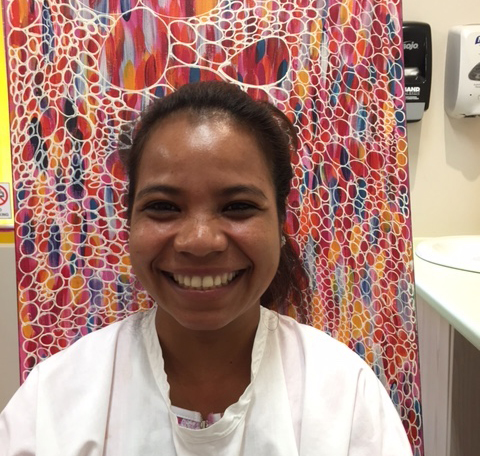
Image: Ana with one of Aunti Barb's art works in Robinvale
Thank you very much for supporting me to do the Kose Nehan Program in east Timor especially Dra. Martin Hall, Dr. Bradly Cristian, Dra. Rachel, Dra. Roonie Lay, Mana Maria, Mana Sally Vong and Mana Lydia, Mana Marcella, Mr.Christoper Dureau and also some Doctors and some Dental Nurses in NRCH, thanks for the experience and supporting from Dra. Lisa because Dra. Lisa is very good and help me to understand about how to do the Program Kose Nehan in East Timor.
I hope all this experience and all the knowledge that you all gave me as key to keep in my brain or save inside my heart as skills to help my community in my beloved country East Timor. I am very appreciate for University Melbourne Dra .Lisa and NRCH can gave me the opportunity to learn the knowledge, the experience, the skills, the motivation, advise, lesson and all this knowledge can make me understand to runny the Program Kose Nehan in East Timor.
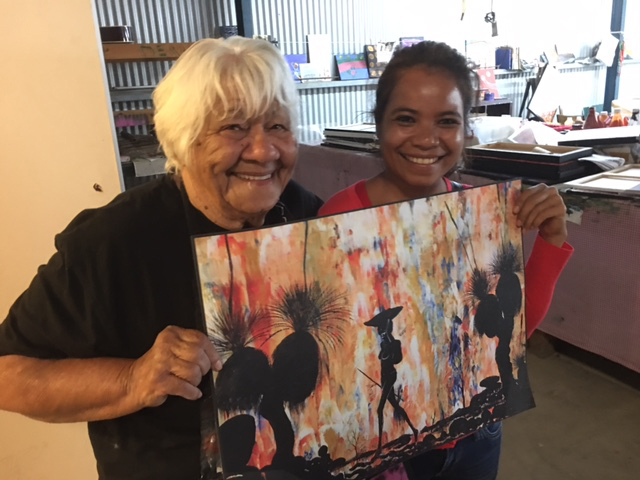
Image: Ana and Aunti Barb
Thank for you all helping because true the Kose Nehan Program we can make a relationship between NRCH, University Melbourne and East Timor. I am very happy to get more second opportunity fly to Melbourne to visit Clinic NRCH and Dra. Lisa in Melbourne University to learn more some knowledge from Dra. Lisa because I want to learn more, the skills that I have learn before when I visit Melbourne is not enough I want to learn more. The knowledge that I have learn in My Country when I compared with the knowledge that I have learn in you Country with Dra. Lisa and NRCH is very different. When I have seen the laboratory is very good more then in east Timor when I compared “Thanks”
I would like to said Thank you very much for My Lovely Dr. Martin Hall with his family, Dra. Rachel with her family, Dra. Roonie Lay with her lovely husband Mr. James and My lovely Mana Lidia Chung with her family, Mana Sally Vong with her family and Mana Annie with her family, thank you for you all kind and helping by your heart because you all can give me a nice place to sleep, food for me and every things that you all gave me, bought for me, and you are all very happy to drop me to visit you house and slept with your family in your house.
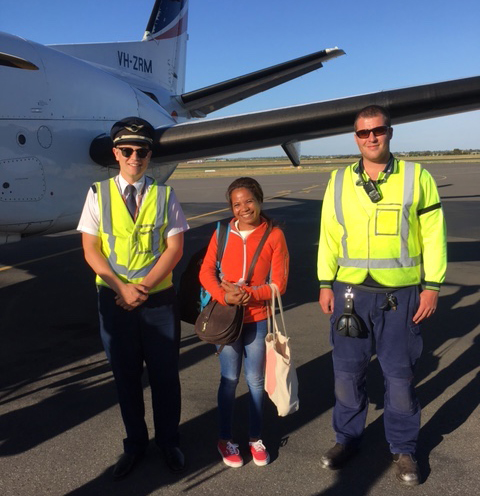
Image: Ana with Rex Pilots at Mildura Airport
Even I have nothing to gave you all but I always pray for you all May God help you all and bless you all become health and protection you all to go for work, anywhere or travel to any Country the God is always with you to protect when you all have some trip.
I am very happy to see you all and your family again if I get the opportunity to visit you all because I really miss you all and I want to visit you back in a next day if I have the opportunity to fly back to your beloved country.
I am apologized and said sorry if I have any mistakes that I did for you, when I visit you and your family I am as human and I can’t scaped from mistakes ’Thanks’Thank you for supporting Kose Nehan Program in East Timor.
Thank you for NRCH and University Melbourne.
This is My report trip when I visit NRCH and Melbourne University.
That’s all and thanks you very much.
